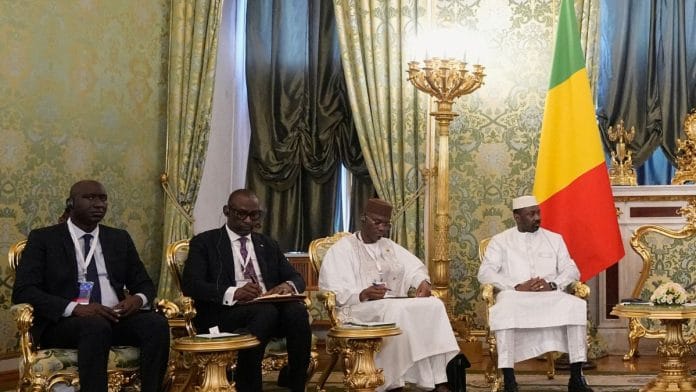New Delhi: Three Indians have been abducted from Kayes in Mali, a country in the Sahel, the geographical region between the dry Sahara in the North and the Sudanian savanna to the South. This region has been witness to a complex security situation for over a decade, buffeted with political instability in recent years.
The Indian government has condemned the “deplorable act” and called on the Malian authorities to take all necessary measures to ensure the secure return of the three Indian nationals who were employed at the Diamond Cement Factory in the West of the African nation.
While no group has claimed credit in particular for the abduction of the Indians, the al-Qaeda linked Jama’at Nusrat al-Islam wal-Muslimin (JNIM) asserted its responsibility for the series of attacks across Western Mali, including the towns of Kayes, Nioro, Sandare, Gogui and Diboli.
Mali, along with its neighbours—Burkina Faso and Niger—have been facing such armed conflicts for the better part of the last decade. The JNIM along with the Islamic State Sahel Province (IS Sahel), have been the most active non-state actors in the region.
Bamako, which has witnessed at least two changes in government, a coup d’etat in 2020 led by the military, which replaced the government of Ibrahim Boubacar Keita (IBK). In 2021, the military junta was further replaced a few months later in May 2021, through another coup d’etat led by military officer Assimi Goïta.
The political changes within Mali also have international implications. On 11 January, 2013, the French government launched Operation Serval at the request of the Malian government to push back the terrorist groups active in the country’s North. However, the subsequent coup d’etat’s have seen France lose its influence over its former colony, with Russia now becoming the primary security guarantor for the country.
Moscow has also supported the regimes in Burkina Faso and Niger, seeing these regions pivot from the West towards Russia and China. In between the geopolitical grapple for influence, the JNIM has thrived, defeating Russian mercenaries and Malian armed forces in July 2024, expanding its offensive across central, northern and western regions of Mali in August of the same year.
Also read: 3 Indians abducted by al-Qaeda-linked terrorists in Mali. India condemns ‘deplorable act’
The rise and rise of JNIM
The JNIM’s genealogy traces back over two decades to the founding of the Algerian based al-Qaeda in the Islamic Maghreb (AQIM) and its predecessor the Salafist Group for Preaching and Combat (GSPC), notes Armed Conflict Location and Event Data (ACLED).
The Sahelian “implant” by the AQIM and the GSPC have since gone through many iterations. In 2017, the JNIM emerged through the merger of different extremist groups, including the Ansar Dine, AQIM’s Sahara region wing, al-Murabitun and Katiba Macina.
The JNIM functions through a three-tier leadership structure—the central leadership, regional commanders and local area commanders, according to ACLED, drawing its support from different regional groups including Tuareg, Arab, Fulani, Songhai and Bambara communities.
In 2016, the birth of Ansarul Islam in Burkina Faso, allowed the JNIM to eventually expand into the country, before launching attacks in Ivory Coast, Togo and Benin by late 2021. The expansion of the group’s military footprint has brought it into conflict with national security forces, international mercenaries (mostly Russian), international forces and rival terrorist organisations including the IS Sahel.
Between March 2017 and September 2023, around 54 percent of all political violence in the Sahel was linked with the JNIM, while around 37 percent was through the state forces, according to ACLED.
Its grip over the Sahel has continued to strengthen. In May 2025, the JNIM raided the towns of Djibo and Diapaga, killing over 200 troops affiliated to the Burkinabe military, showcasing its strength and reach across the Sahel. In the same month, JNIM, according to reports, stormed a Malian military camp and killed 40 soldiers.
Its continued strengthening has allowed it to expand its footprint across Mali, including in the regions surrounding Bamako. In September 2024, JNIM launched multiple attacks at Bamako, the capital of Mali, including at the Modibo Keita International Airport. The attacks reportedly killed around 100 Malian troops, however, the military leadership did not release the details publicly.
With JNIM’s growing footprint, President Assimi Goïta suspended all political activities in Mali in the first week of May 2025. The al-Qaeda linked group remains the most active in the Sahel, with a footprint spanning at least eight countries in the region, according to ACLED.
(Edited by Zinnia Ray Chaudhuri)
Also Read: After fall of Syria, al-Qaeda’s Indian jihadists see hope of resurrecting their Caliphate dream






